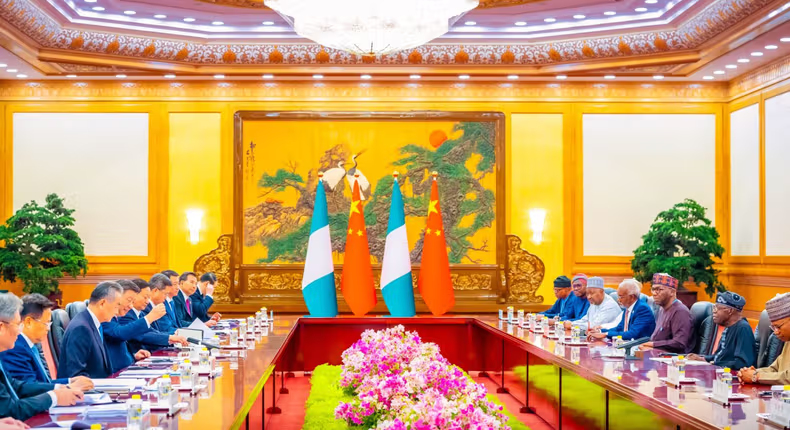President Bola Tinubu has reaffirmed his commitment to completing the Ibadan-Abuja-Kaduna-Kano railway project, promising that it will be finished to the satisfaction of Nigeria and the wider West African region. This assurance was made during his visit to the headquarters of China Railway Construction Corporation (CRCC) in Beijing, where he praised the company’s ongoing contributions to Nigeria’s infrastructure development.
Acknowledging CRCC as a reliable partner, President Tinubu highlighted the significance of the railway project for Nigeria’s economic connectivity and regional integration. He assured CRCC’s Chairman, Dai Hegen, of Nigeria’s continued support for the company’s investments in solid minerals and other ventures.
Hegen informed the President that CRCC has been involved in Nigeria for 43 years, executing over 300 projects and training over 100,000 local workers. Notably, the Abuja-Kaduna and Lagos-Ibadan railways have transported approximately 9 million passengers and 180 tonnes of cargo, while the Lagos Blue Line has served over 1.6 million passengers.
In addition to his visit to CRCC, President Tinubu also toured Huawei Technologies’ Beijing Research Centre. During the visit, Huawei announced the launch of DigiTruck, a mobile ICT classroom aimed at enhancing digital literacy in underserved Nigerian communities. This initiative is part of Huawei’s broader commitment to training at least 3,000 students annually across 10 states.
President Tinubu’s visit also focused on Nigeria’s digital development. Huawei’s Chairman, Liang Hua, praised the President’s Renewed Hope Agenda, emphasizing the role of digital technology in driving economic growth. Huawei expressed its readiness to support Nigeria’s digital transformation through partnerships, including the development of a joint PV test lab with the Rural Electrification Agency (REA).
Chris Lu, CEO of Huawei Nigeria, reiterated the company’s support for Nigeria’s National Talent Export Programme (NATEP), aiming to position Nigeria as a leading hub for technology talent outsourcing in Africa. The delegation was also introduced to Huawei’s latest innovations in e-government, smart education, smart grid, and solar power, which have the potential to significantly enhance public services and digital governance in Nigeria.
